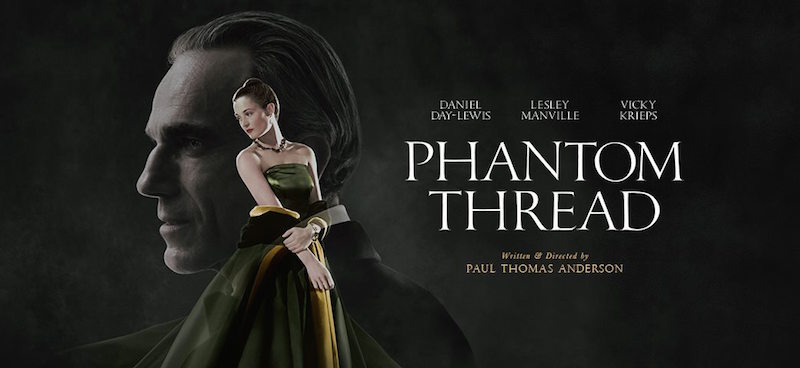PHANTOM THREAD
Writer/Director: Paul Thomas Anderson
Starring: Daniel Day-Lewis, Lesley Manville, Vicky Krieps, Harriet Sansom Harris
When Daniel Day-Lewis announced he was planning on retiring, there was public outcry knowing that we would never see another performance from out of the greatest actors of our time. If that were indeed the case, than Day-Lewis’ turn as Reynolds Woodcock is an excellent performance to go out on. That really shouldn’t surprise anyone given the three-time Oscar winner’s filmography. One of his Oscars was for his performance in There Will Be Blood from filmmaker Paul Thomas Anderson. They’ve reunited for Phantom Thread making them one of the greatest director/actor pairings to grace the silver screen.
Set in London in the 1950s, Reynolds Woodcock is a world-renowned designer and dressmaker. To call his work special would underscore the effect and power they have on the women who are fortunate enough to wear a Woodcock original. When his seamstresses are seen wearing smocks as part of their uniform, you get the distinct impression he is very particular about his work and what all goes on at the House of Woodcock. His trademark is to keep something hidden in each garment as a secret. It’s a remembrance piece for his mother as the pain of her death still resides in him. Reynolds is a self-described bachelor who claims he is not suited for marriage. His solo lifestyle is questioned when he meets Alma (Krieps), a young waitress whom he engages in some innocent flirting with at her restaurant. Alma goes on to become his muse and lover disturbing the ritualistic way he lives his life. What should be a joyous next chapter for Reynolds becomes a painful annoyance for the kind of genius who can’t be bothered by anyone else’s opinions or daily habits.
Paul Thomas Anderson is a writer and director who never takes the easy way out. Every frame, sound effect, and performance in his films is made with a specific intention behind it at times disrupting the audiences’ ideas for where his movies are headed whether it’s Magnolia, The Master, or Boogie Nights. One could draw parallels from his work ethic and the way he has written the character of Reynolds Woodcock. Both are masters in their craft with a precise attention to detail. He makes the film a sensual feast, as that is how Reynolds sees and lives his life. Anderson makes the audience acutely aware of just how flaky the croissants are, the rich and smooth flow of black coffee in the morning, the structural appearance of every dress, and the sharp sound a needle makes piercing through fabric. He wants us to feel every pain and joy Reynolds experiences. At one point Reynolds threatens his sister and business associate Cyril (Manville) stating, “There is an air of quiet death in the house, and I do no like the way it smells.” By this point in the film, Anderson makes it quite clear that all is not well in the House of Woodcock.
I made the claim earlier that Daniel Day-Lewis is one of the greatest actors of our time. He’s a man of extreme dedication to his work with the reputation of burying himself deep into every one of his characters. He emanates a raw intensity that can’t be matched, the consummate ideal of wholly inhabiting a character making each one different without losing site of him, the actor, at the same time. It comes as no surprise that he learned how to make a couture gown in order to play Reynolds Woodcock. Parallels can also be drawn between Day-Lewis and the character. Both are adored and revered for their work as we wait with anticipation for their next creation. He’s the kind of actor who never shows his full hand making Reynolds a bit of a mystery. It’s clear that he’s sitting on the edge of losing it, and we’re just waiting for that moment when Day-Lewis can let it all go, much like we saw him do as Daniel Plainview in There Will Be Blood, Bill the Butcher in Gangs of New York, or even in a quiet way as President Lincoln. Day-Lewis appears to be drawn to extremely flawed characters, and he makes Reynolds Woodcock very hard to like as the relationship between he and Alma progresses. He makes you shift your focus to the women in the movie and how they shine as the heroes of the story.
It’s easy to see this is as a Daniel Day-Lewis movie, but you would be discrediting two of the best performances of the year with Vicky Krieps as Alma and Lesley Manville as Cyril. The Alma that is introduced in the beginning of the film is vastly different than how we see her by the end. Krieps takes her through a gauntlet trying to find her place in Reynolds’ world whether she’s his muse, significant other, or merely a lousy assistant. It’s not easy to match the intensity brought on by Day-Lewis, but Krieps handles the task with ease. It’s wickedly fun to watch both she and Cyril stand there ground against him, which does not come easily. As Cyril, Manville makes her direct and equally strong, not one you would ever want to cross. The fights between these characters make for some for some of the best confrontations on screen in 2017.
I would be remiss if I did not mention Jonny Greenwood’s score as one of the key components as to why Phantom Thread is one of the masterpieces of Paul Thomas Anderson’s career. A good score can complement any movie and give an emotional connection to the themes at hand. It’s another thing to have the score feel like its part of the movie’s soul elevating the film to the next level. Greenwood has scored every one of Anderson’s films since There Will Be Blood. It runs almost constantly throughout Phantom Thread as if it was a complete piece of music with the film created around it, not the other way around. Greenwood’s music is beautiful and lyrical when needed culminating in a haunting sound in the final climax.
The creative triad of Paul Thomas Anderson, Daniel Day-Lewis, and Jonny Greenwood is one for the books as Phantom Thread is a stunning feat for the three of them. It has that Old Hollywood/film noir vibe that’s exquisite from frame one until the shocking ending taking the audience on a fascinating visit into the House of Woodcock. It goes in some unexpected directions asking if a character like Reynolds Woodcock can be changed by love or if he even knows how to love. Just when you think Daniel Day-Lewis couldn’t get any better, he proves he has one final trick up his sleeve.
Is It Worth Your Trip to the Movies? If this is Daniel Day-Lewis’ last movie, then he retires with a masterpiece bookending his illustrious career.
RATING: 5 out of 5 TICKET STUBS






